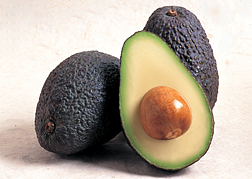In recent weeks, two new studies were published on the benefits of lutein for cognitive function and mental focus. In the first study, researchers explored whether dietary approaches may have benefits for cognitive health, especially in midlife and for overweight individuals. The researchers found that individuals who consumed avocados were better able to perform certain cognitive tests, and they had higher levels of lutein.
In the second study, researchers did a systematic review to see is consumption of carotenoids showed cognitive health benefits. The study found positive results for lutein and astaxanthin.
Study One: Lutein from Daily Avocado Consumption May Improve Attention

A diet including daily avocado consumption improves the ability to focus attention in adults whose measurements of height and weight are categorized as overweight or obese, a new randomized control trial found. Researchers at the University of Illinois at Urbana-Champaign conducted the 12-week study, published in the International Journal of Psychophysiology (The Hass Avocado Board and the U.S. Department of Agriculture’s National Institute of Food and Agriculture supported this work).
Avocados are high in lutein, a dietary component associated with cognitive benefits. Though avocado consumption’s benefits have been studied in older adults and children, no randomized controlled trials had studied its cognitive effects on adults with overweight or obesity, despite 70% of the American adult population falling into that category, said graduate student Caitlyn Edwards, the first author of the study.
“Previous work has shown that individuals with overweight and obesity are at higher risk for cognitive decline and dementia in older age,” said kinesiology and community health professor Naiman Khan, who led the study. “We are interested in whether dietary approaches may have benefits for cognitive health, especially in midlife.”
In the new study, the researchers provided 12 weeks of daily meals to 84 adults with overweight or obesity. The meals were identical in calories and macronutrients, but one group’s meals included a fresh avocado every day, while the control group had no avocado in their meals.
At the beginning and end of the study, the participants completed three cognitive tests to measure attention and inhibition. In addition, the researchers measured lutein levels in the participants’ serum and in their retinas, which is associated with the lutein concentration in the brain.
- They found that the participants whose diets included avocados improved their performance on one of the cognitive tests, called the Flanker task, which measures attentional inhibition — the ability to maintain focus on the task at hand even in the face of distraction. However, there was no difference in the other two cognitive tests.
- Another unexpected finding was that, while the participants who ate avocados had higher levels of lutein at the end of the study, the changes in lutein levels were not correlated with their cognitive changes.
“Avocados also are high in fiber and monounsaturated fats. It is possible that these other nutrients may have played a role in the cognitive effects we saw, but we focused on the lutein in our analyses,” Edwards said. “Future analyses may focus on other nutrients found in avocados, or avocado consumption’s impact on other measures such as weight status, inflammation and potential changes in the microbiome.”
Although this study focused on avocados, other dietary sources of lutein, fiber and unsaturated fats — such as green leafy vegetables or eggs — also have potential cognitive and health benefits. The researchers say their study shows that small dietary changes, such as eating avocados, can have measurable impacts on cognitive performance, even when other health behaviors remain the same.
Study Two: Lutein and Astaxanthin Intake on the Improvement of Cognitive Functions among Healthy Adults
Fruits and vegetables are generally rich in antioxidants such as carotenoids. Consumption of carotenoids is expected to have benefits on cognitive functions in humans, however, previous randomized controlled trials (RCT) using carotenoids have reported inconsistent results. Therefore, this systematic review (SR) aimed to summarize the effect of carotenoid intake on cognitive functions in humans.
The researchers reviewed research papers from PubMed, Cochrane Library, Web of Science, and PsychoINFO on carotenoid intake with the criteria that 1) oral carotenoid intake was evaluated using RCTs, 2) participants were healthy young, middle-aged, or older, and 3) cognitive functions were measured using RCTs.

Five studies using lutein and two studies using astaxanthin met the inclusion criteria. Only studies where the intake of carotenoids was oral were included in the review. Participants also had to have taken only one type of carotenoid, however, the simultaneous intake of two or more types of carotenoids was allowed if the combined carotenoids were of similar function and biodistribution (e.g., lutein and zeaxanthin)
In the study results, consumption of lutein and its isomer showed consistent results in selective improvement of visual episodic memory in young and middle-aged adults while inhibition was observed in middle-aged and older adults. One of the two included astaxanthin studies reported a significant improvement of verbal episodic memory performance in middle-aged adults.
Summary:
- Three of the five studies with lutein reported significant benefit on several cognitive functions (visual episodic memory, verbal episodic memory, inhibition, and attention) compared to the placebo control group.
- For astaxanthin, one of two studies showed significant improvements in memory performance compared to the placebo group. However, these findings should be interpreted with limitations due to the small number of studies.
- Based on these findings, 10 mg lutein consumption for twelve months can lead to improvement of visual episodic memory performance in young and middle-aged adults and improvement of inhibition performance in middle-aged and older adults.
Conclusion/ The study results showed that 10 mg lutein per day for twelve months can lead to improvement of cognitive functions. Due to the small number of studies, it is difficult to conclude whether astaxanthin would have a positive effect on cognitive functions.





